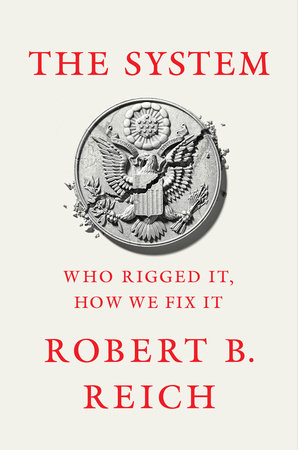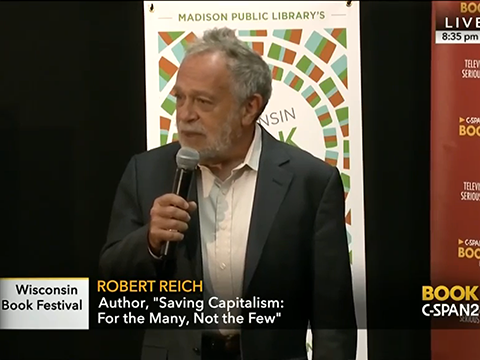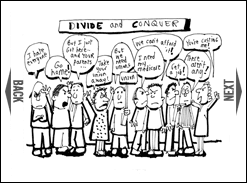 Robert Reich's writes at robertreich.substack.com. His latest book is "THE SYSTEM: Who Rigged It, How To Fix It." He is Chancellor's Professor of Public Policy at the University of California at Berkeley and Senior Fellow at the Blum Center. He served as Secretary of Labor in the Clinton administration, for which Time Magazine named him one of the 10 most effective cabinet secretaries of the twentieth century. He has written 17 other books, including the best sellers "Aftershock,""The Work of Nations," "Beyond Outrage," and "The Common Good." He is a founding editor of the American Prospect magazine, founder of Inequality Media, a member of the American Academy of Arts and Sciences, and co-creator of the award-winning documentaries "Inequality For All," streaming on YouTube, and "Saving Capitalism," now streaming on Netflix.
Robert Reich's writes at robertreich.substack.com. His latest book is "THE SYSTEM: Who Rigged It, How To Fix It." He is Chancellor's Professor of Public Policy at the University of California at Berkeley and Senior Fellow at the Blum Center. He served as Secretary of Labor in the Clinton administration, for which Time Magazine named him one of the 10 most effective cabinet secretaries of the twentieth century. He has written 17 other books, including the best sellers "Aftershock,""The Work of Nations," "Beyond Outrage," and "The Common Good." He is a founding editor of the American Prospect magazine, founder of Inequality Media, a member of the American Academy of Arts and Sciences, and co-creator of the award-winning documentaries "Inequality For All," streaming on YouTube, and "Saving Capitalism," now streaming on Netflix.
+ MY LINKTREE + SUPPORT INEQUALITY MEDIA
+ FOLLOW ON TUMBLR + TWITTER + FACEBOOK
NEW: The System
Who Rigged It, and How We Fix It
Order here:
AmazoniBookstoreBN.comIndieBoundRandomHouseThe Common Good
Why we must restore the idea of the common good to the center of our economics and politics
Order here:
AmazoniBookstoreBN.comIndieBound
Economics in Wonderland
A cartoon guide to a political world gone mad and mean
-

Saving Capitalism
For the Many, Not the Few
Order here:
AmazoniBookstoreBN.comIndieboundRandomHouse 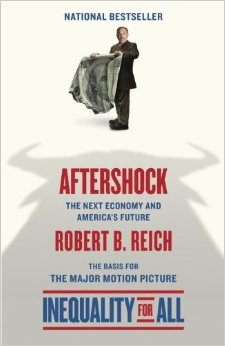
Aftershock
The Next Economy and America's Future
Buy this book at:
AmazoniBookstoreBN.comIndieboundPowellsRandomHouse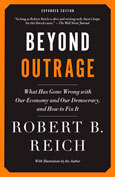
New Editions Available Now
Beyond Outrage:
What has gone wrong with our economy and our democracy, and how to fix itPreorder the Trade Paperback:
BN.comIndieBoundAmazonRandomHouse
Preorder the Expanded eBook:
AmazoniBookstoreBN.comRandomHouse
Preorder the Expanded, Enhanced eBook (w/ videos):
AmazoniBookstoreBN.com
Supercapitalism
The Transformation of Business, Democracy, and Everyday Life
Buy this book at:
AmazoniBookstoreBN.comIndieboundPowellsRandomHouse
Reason
Why Liberals Will Win the Battle for America
Buy this book at:
AmazoniBookstoreBN.comIndieboundPowellsRandomHouse
Locked in the Cabinet
A memoir of four years as Secretary of Labor
Buy this book at:
AmazonBN.comPowellsIndieboundRandomHouse
4 Myths About Raising the Minimum Wage
The federal minimum wage of $7.25 an hour has not been raised since 2009. That’s the longest period without an increase since the minimum wage was enacted, meaning today’s minimum wage is actually worth far less than it was in 2009.
This is an insult to American workers, and bad for our economy. It’s far past time to raise the minimum wage to at least $15 an hour.
******
Btw, if you’d like my daily analyses, commentary, and drawings, please subscribe to my free newsletter: robertreich.substack.com
******
Today’s minimum wage is a starvation wage. A full-time minimum wage worker cannot afford a two-bedroom rental in any city, county, or state in the entire country. Meanwhile, billionaires like Jeff Bezos can afford a D.C. mansion with 25 bathrooms and 5 living rooms — just one of his many mansions.
Now, the current minimum wage isn’t so low because these workers are “worth” less than they were years ago; quite the opposite. If the minimum wage had kept pace with workers’ productivity increases since 1968, it would be over $22 an hour today.
Even so, conservatives are out to scare you about raising the wage. Let’s debunk each of their talking points.
Myth #1: If businesses have to raise wages, they’ll cut employees’ hours or cut jobs altogether.
Rubbish. Since at least the 1930s, critics have argued that setting any minimum standard of decency at the workplace will raise employer costs and kill jobs — child labor laws, the 40-hour workweek, and workplace safety laws. Look: Treating workers decently is worth the price.
Besides, an abundance of research shows that increases in the minimum wage do not reduce the overall number of jobs. Researchers examined 138 state-level minimum wage increases and found that the number of low-wage jobs remained essentially unchanged in the five years after the minimum wage increase, but paid more (See: Effect of Minimum Wages on Low-Wage Jobs*)
That’s a job upgrade, not a job loss, and multiple studies have come to the same conclusion.
When I led the fight to raise the minimum wage in 1996, many conservatives predicted huge job losses. Well, I’m happy to report that after the increase, almost 10 million low-wage workers received a raise with no decline in overall employment. It’s simply a myth that raising the wage automatically means lost jobs.
Not to mention the benefits for workers themselves. Raising the wage to $15 an hour by 2025, as proposed in the Raise the Wage Act, would give 32 million workers a raise.†
Here’s the bottom line: If your business model depends on paying your workers starvation wages, you should not be in business.
Myth #2: Small businesses won’t be able to afford the higher wage and will be put out of business.
Baloney. The fact is, a higher minimum wage can actually lower costs to small businesses.
How? For starters, a higher minimum wage attracts more potential workers into the labor force, thereby giving employers more choice of whom to hire. This leads to higher productivity and better service. Better service means more satisfied clients and customers. Higher paid workers are also more likely to stick around, saving businesses the hefty costs that come with recruiting, hiring, and training new workers.
A study of the San Francisco airport confirms this: researchers found that following a wage increase, a majority of workers who received a raise improved their overall performance. The higher wages even led to shorter airport lines. Researchers also found that employee turnover declined by 34 percent – saving employers an estimated $6.6 million a year.
Smart business owners understand this. Henry Ford, after introducing the “five dollar day” in 1914 when the typical industry wage was less than half that, called it his best cost-cutting strategy because of the productivity boost that followed.
Myth #3: If the wage is raised, prices for everything will skyrocket and lead to widespread inflation.
Wrong again. Researchers have found that for every 10 percent increase in the minimum wage, prices increase by less than half a percent. And it’s a temporary price increase — occurring only in the month the wage hike goes into effect. No way this sparks inflation.
In fact, the minimum wage needs to be raised so that it can catch up with inflation. Because of inflation, the minimum wage is now worth almost a third less than it was in 1968. And since it was last raised in 2009, it’s lost 17 percent of its value. This means that compared to 2009, minimum wage workers have lost $3,950 every year, leaving them with less money in their pockets to spend and keep the economy going.
That’s why a higher minimum wage would boost economic growth. 70 percent of the economy depends on consumer spending, so more money in people’s pockets means they can spend more on the goods and services that keep the economy going.
Oh, and raising the minimum wage would reduce the amount of money taxpayers spend on public assistance that families need because their breadwinners don’t make enough to live on. It’s estimated that nearly half of federal minimum wage workers’ families are enrolled in at least one safety net program, costing the public $107 billion every year. That’s right: our tax dollars are subsidizing corporations that don’t pay a living wage.
Myth #4: Most minimum wage workers are teenagers making some extra money on the side; they don’t need a wage increase.
More rubbish. While this might have been the case in 1968, it certainly isn’t now. Today, only 1 in 10 workers who would benefit from a $15 minimum wage is a teenager. More than half are between the ages of 25 and 54. More than half of them work full time, and over a quarter have children. Nearly 8 million are mothers.
Today’s starvation wage hurts people who are in their prime earning years, preventing them from building wealth and establishing financial security.
Raising the minimum wage would also help reduce racial and gender pay disparities. Minimum wage increases and expansions in the late 1960s reduced the income gap between Black and white workers. Raising the wage would have a similar effect today, because Black workers, Hispanic workers, and women comprise a large portion of today’s low-wage workers.
In sum, raising the minimum wage is good for workers, good for businesses, and good for the economy. In addition to all this, raising the minimum wage is the morally correct thing to do. It ought to lift working people out of poverty, not keep them in it.
We’re the richest country in the world, home to the richest people on the planet. We can, and we must, treat our workers with the dignity and respect they deserve. That starts with paying them a living wage.
